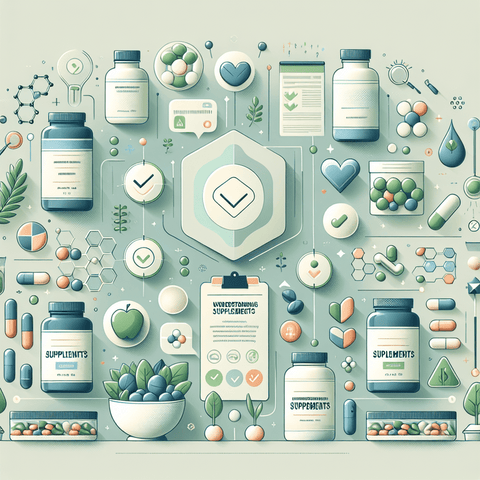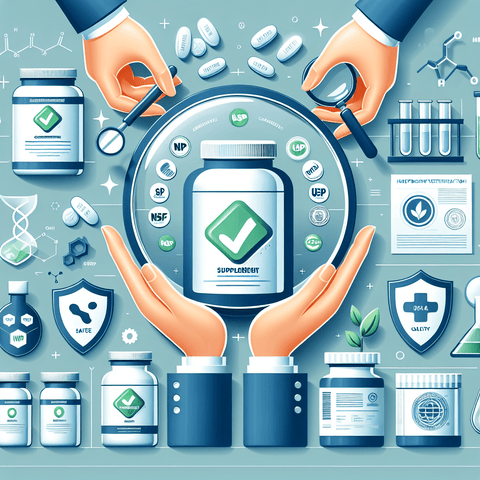Introduction
In recent years, the landscape of health and wellness has undergone a significant transformation, with nutritional supplements gaining immense popularity worldwide. From boosting immunity and enhancing athletic performance to supporting overall wellness, these products have become integral to many individuals’ daily routines. The surge in supplement consumption is driven by an increased awareness of health issues, the desire for preventive care, and advancements in science that underscore the importance of essential vitamins, minerals, and other nutrients.
However, as the demand for supplements grows, so does the risk of encountering counterfeit or substandard products that threaten consumer safety and diminish the benefits consumers seek. Counterfeit supplements can contain harmful ingredients, incorrect dosages, or even dangerous contaminants, posing serious health risks. On the other hand, low-quality products may fail to deliver promised effects, wasting your hard-earned money and possibly delaying necessary health interventions.
This comprehensive guide aims to equip you with the knowledge needed to distinguish genuine, high-quality supplements from counterfeit or inferior options. By understanding what makes a supplement trustworthy, how to verify authenticity, and where to purchase them safely, you can make informed choices that prioritize your health and safety. Whether you're a seasoned supplement user or new to the scene, this guide will help you navigate the complex world of nutritional products with confidence.
1. Understanding What Makes a Supplement High-Quality and Why It Matters
In the realm of nutritional health, the term "high-quality supplement" encompasses products that meet strict standards for safety, efficacy, and transparency. High-quality supplements are formulated using ingredients that are accurately labeled, free from contaminants, and manufactured in facilities adhering to rigorous standards. They are designed to deliver the intended health benefits while minimizing potential risks associated with low-grade or adulterated products.
Differentiating premium supplements from lower-tier products hinges on several key factors. Ingredient sourcing is paramount; reputable manufacturers ensure their ingredients are derived from trusted suppliers, often with certifications indicating organic, non-GMO, or sustainably farmed origins. Manufacturing standards such as Good Manufacturing Practices (GMP) guarantee adherence to quality and safety protocols. Additionally, transparency in ingredient listing and dosage information allows consumers to make informed decisions, knowing exactly what they are ingesting.
The impact of supplement quality extends beyond efficacy—poor-quality products can introduce harmful contaminants like heavy metals or bacteria, leading to adverse health effects. Conversely, high-quality supplements foster consumer trust, provide consistent results, and support long-term health goals. Recognizing indicators such as ingredient purity, manufacturing certifications, and third-party testing results helps you discern trustworthy products from subpar ones and ensures that your health isn't compromised by counterfeit or fraudulent items.
Furthermore, certifications like GMP (Good Manufacturing Practices), NSF International, and USP (United States Pharmacopoeia) verification serve as industry benchmarks for quality and safety. These seals indicate that the supplement has undergone rigorous testing and complies with recognized standards, adding an extra layer of assurance for conscientious consumers.
2. Dietary Supplement Authenticity: Ensuring You're Getting the Real Deal
The proliferation of counterfeit supplements is a pressing concern, with reports indicating an alarming rise in fake products pouring into markets globally. Counterfeit supplements are often illegally manufactured and may mimic genuine packaging, but they can contain unapproved ingredients, incorrect dosages, or dangerous contaminants, posing serious health risks. It’s crucial to learn how to recognize authentic supplements and protect yourself from these dangers.
Authentic supplements usually feature packaging and labeling that adhere to strict standards. Clear, professional printing, tamper-evident seals, holograms, and serial numbers are common indicators of genuine products. Many reputable brands include QR codes or verify codes on their packaging, allowing consumers to confirm authenticity with the manufacturer directly. Properly sealed bottles, consistent labeling practices, and precise ingredient lists are other signs to watch for.
One effective way to verify authenticity is to check serial or batch numbers—these can often be validated via the manufacturer’s official website or customer service. Tamper-evident seals and holograms are additional security features designed to prevent counterfeiting and should be intact before purchase. When in doubt, contact the manufacturer or authorized distributors for verification and avoid products from dubious sources.
Counterfeit supplement cases have been reported globally, sometimes resulting in severe health consequences. For example, fake herbal extracts containing undeclared pharmaceuticals or heavy metals have caused poisoning incidents. Learning from these situations emphasizes the importance of purchasing from reliable sources, scrutinizing packaging details, and staying informed about common counterfeit traits to safeguard your health.
3. Premium Supplement Selection: Choosing the Best Products for Your Needs
Achieving optimal health often starts with selecting the right supplements tailored to your specific needs. The first step is to identify your nutritional gaps—whether it's boosting your immune system, improving bone health, supporting brain function, or enhancing athletic performance. Consulting with healthcare professionals and conducting blood tests can help clarify your priorities and set realistic goals.
With clear objectives, evaluate ingredient lists meticulously. Prioritize products that provide transparent labeling, listing all active ingredients with precise dosages. Be wary of proprietary blends, which often mask the actual amounts of individual constituents. Instead, look for products that specify the bioavailability—how well your body can absorb and utilize the nutrients—especially with minerals like magnesium or vitamins like D and K.
Formulations matter; for example, liposomal versions of vitamins can improve absorption compared to standard tablets. When choosing among different formats—capsules, powders, liquids—consider your preferences, absorption efficiencies, and convenience, but ensure the product adheres to quality standards. Organic, non-GMO, and sustainably sourced ingredients add value, guaranteeing that you're not ingesting unnecessary chemicals or contaminants.
Avoid products loaded with unnecessary fillers, artificial flavors, or preservatives. These additives aren’t just superfluous—they may cause adverse reactions in sensitive individuals. Comparing brands and scrutinizing third-party testing results can help you pick the best products for your health objectives. For instance, if you're interested in supporting your immunity, exploring options such as vitamin C ([see here](https://www.topvitamine.com/collections/vitamin-c-benefits-immunity-antioxidant-energy)) can be a good starting point. For bone health, vitamin K-rich formulations are vital, and choosing supplements with verified potency ensures you're getting the most benefit.
4. Trusted Supplement Brands: Building a Reliable List of Go-To Choices
Brand reputation plays a critical role in the supplement industry. Reputable brands prioritize quality control, transparency, and consumer safety. When selecting a brand, consider their manufacturing practices, certifications, and history of third-party testing. Certifications such as GMP (Good Manufacturing Practice), NSF, USP, and Informed-Sport are strong indicators of a company's commitment to quality.
Research each brand's background: how long they've been in business, their sourcing practices, and whether they openly publish their testing reports. Customer reviews and testimonials provide additional insight—positive feedback consistently reflecting product efficacy, purity, and honest marketing bolster confidence in a brand.
Examining the company’s testing policies is essential; trustworthy brands often submit their products for independent verification to ensure ingredient accuracy and contaminant absence. For example, brands that offer supplements such as [DHA/EPA Omega-3s](https://www.topvitamine.com/collections/dha-epa-omega-3-supplements) undergo rigorous testing to confirm purity and potency. Comparing trustworthy brands with less established or unverified competitors can help you establish a reliable list of go-to products that support your health with confidence.
Remember, building a repertoire of trusted brands is not only about product quality but also about ongoing support and customer service. Reliable companies actively stay ahead of industry standards and are transparent about their manufacturing and testing procedures, reinforcing your assurance that you're choosing safe, effective supplements.
5. Safe Supplement Purchasing: Tips for Buying with Confidence
Purchasing supplements safely requires vigilance, especially in an era where online shopping is prevalent. Always buy from reputable sources—this could include the brand’s official website, authorized retail partners, or established brick-and-mortar pharmacies. Avoid purchasing from suspicious or unverified online marketplaces, which often harbor counterfeit or expired products.
When shopping online, verify the legitimacy of the website—look for secure payment options, clear contact details, and transparency in product information. Be cautious of excessively low prices or offers that seem too good to be true; these are often red flags for counterfeit goods. Additionally, check for customer reviews and ratings to assess product legitimacy and seller credibility.
Always purchase directly from the manufacturer or authorized distributors to reduce the risk of encountering fake products. Keep receipts, shipping details, and product labels, as these documents may be useful in case you need to report issues or verify authenticity later. Remember, avoiding shady sales tactics such as misleading marketing claims or missing product information is critical to safeguarding your health.
Consider paying with secure methods like credit cards or verified payment platforms that offer fraud protection. With online safety practices in place, you can confidently acquire high-quality supplements that meet your expectations and health needs.
6. Verified Supplement Sources: Ensuring You're Buying from Reputable Outlets
Beyond individual brand websites, reputable supplement sources extend to trusted online retailers, pharmacy chains, and specialty health stores. These outlets often employ strict vetting processes, ensuring that their inventory complies with safety and quality standards. Factors like retailer accreditation, customer feedback, and third-party verification influence their reliability.
Verifying a retailer’s legitimacy involves checking for official certifications, clear contact information, and transparent return or refund policies. For online purchases, look for secure HTTPS connections, verified seller badges, and verified reviews. Using well-known and trusted platforms minimizes exposure to counterfeit products and guarantees you receive genuine items.
Third-party validation plays a critical role here; many marketplaces partner with independent testing agencies to certify their products’ authenticity. For example, choosing [trusted vendors](https://www.topvitamine.com/collections/vitamin-d-benefits-sources-safety) that display third-party testing results ensures you’re buying supplements that meet high standards.
Some of the most reputable outlets include direct brand stores, certified online supplement retailers, and well-established pharmacy chains. Additionally, subscription services that partners with recognized brands often provide the convenience of regular, verified product delivery. Navigating international versus domestic sources requires understanding customs regulations and potential import tariffs, but always prioritize sources with proven track records for authenticity and quality assurance.
Conclusion
Choosing high-quality supplements is a crucial step in safeguarding your health and maximizing the benefits of your wellness routine. By understanding what makes a supplement trustworthy—such as ingredient purity, manufacturing standards, certifications, and genuine packaging—you can confidently avoid counterfeit products and inferior options. Building a list of reputable brands and sourcing your supplements from verified outlets ensures that what you consume aligns with your health goals and safety standards.
Remaining vigilant, conducting thorough research, and consulting professionals when necessary are essential practices for making informed decisions. As supplement regulations evolve and new products emerge, staying educated and cautious will serve you well in your journey toward optimal health. Remember, investing in high-quality supplements is an investment in your long-term wellbeing.
Call to Action
Discover our curated selection of reputable supplement brands at topvitamine.com and browse categories such as Vitamin C for immunity and energy, Vitamin D sources and safety, and Vitamin K for bone and blood health. Consult with healthcare professionals before starting new supplements, especially if you have underlying health conditions. Stay updated by subscribing to our newsletter for the latest insights on supplement quality and safety.
Q&A Section
Q1: How can I tell if a supplement packaging is genuine?
Authentic supplement packaging features clear, professional printing, tamper-evident seals, holograms or verification codes, and serial numbers. Always check for consistency with known brand standards and verify batch numbers via the manufacturer’s website if available.
Q2: Are third-party certifications enough to guarantee supplement quality?
While certifications like GMP, NSF, and USP significantly enhance confidence, they should be part of a broader evaluation, including transparent ingredient lists and reputable brand reputation. Combining these factors provides a more comprehensive assurance of quality.
Q3: Why is it important to buy directly from official sources?
Purchasing directly from official brand websites or authorized retailers minimizes the risk of counterfeit products, ensures authenticity, and often guarantees access to the latest quality-tested products and proper customer support.
Q4: What are the dangers of counterfeit supplements?
Counterfeit supplements may contain harmful contaminants, unapproved pharmaceuticals, incorrect dosages, or lack active ingredients altogether. Consuming such products can lead to adverse health effects, allergic reactions, or interactions with medications.
Q5: How do I choose the best supplement for my needs?
Identify your nutritional gaps, research ingredients thoroughly, consider bioavailability and formulation, and consult healthcare professionals. Always choose products with transparent labeling, third-party testing, and positive reviews to ensure safety and efficacy.
Important Keywords
- High-quality supplements
- Counterfeit supplements
- Supplement authenticity
- Reputable supplement brands
- Supplement safety tips
- Third-party testing
- Supplement certification
- Supplement purchasing guide
- Trusted supplement sources
- GMP, NSF, USP certifications
- Organic and non-GMO supplements
- Supplement verification methods
- Immune support supplements
- Bone health supplements
- Omega-3 supplements
- Vitamin D/Safety



